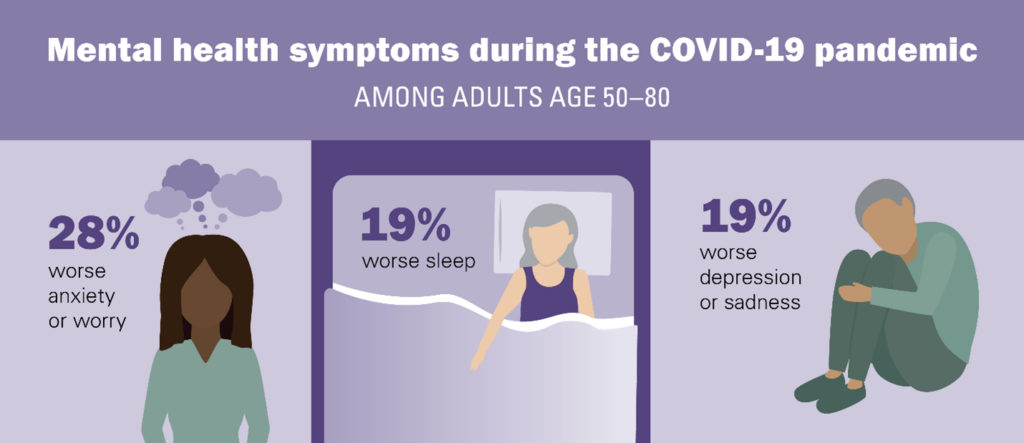What’s Public Health Got To Do With… Mental Health?

According to Trust for America’s Health’s 2023 Pain in the Nation report, the rate of U.S. deaths due to alcohol, drugs, and suicide rose 11% in 2021. While an all-time record, 209,225 Americans lost their lives due to alcohol, drugs or suicide during the year, these deaths continued a two-decade trend of sharply increasing fatalities due to substance misuse and suicide in the U.S. These data suggest that increasing supports for mental health across all populations is an urgent need. When it comes to older adults, the trends remain disturbing. According to data from the National Poll on Healthy Aging, approximately one in five older adults experience depression, anxiety, insomnia, substance use, or another mental health disorder. Furthermore, the COVID-19 pandemic caused many older adults to experience an increase in symptoms of mental illness.

Older Adults and Mental Health
Many factors can predispose older adults to the development or exacerbation of mental health conditions. The World Health Organization reports that health events associated with aging such as hearing loss, vision loss, and the decline of one’s ability to independently perform activities of daily living (ADLs) can impact the mental health of older adults, as well as precipitate social withdrawal. In turn, withdrawal from social interaction can lead to the deterioration or loss of social support systems, which itself can further harm mental health. Older adults face an inherent risk for worsening mental health due to the physical impacts of aging, and external factors such as climate change and substance use can further compound the risk, indicating the need to ensure that mental health services are available and accessible to older adults.
Climate Change
While climate change threatens the mental health conditions of many age groups, older adults are particularly vulnerable to its impacts. In 2022, the National Council on Aging published an article describing the unique circumstances faced by older adults that impact their experience of the consequences of climate change. Weather-related emergencies can exacerbate an older adults’ mental health conditions like anxiety and depression. And, being dependent on caregivers for medication access and/or activities of daily living as well as managing complex medical conditions are also made more difficult during emergencies. .
Substance Use
In 2017, the Substance Abuse and Mental Health Services Administration (SAMHSA) released an article signaling the emergence of substance use as a public health problem among older adults. Across all the datasets that SAMHSA examined, alcohol use was a specific problem area for this population, and is particularly concerning because older adults are often more likely to experience the physiological effects of alcohol. Additionally, dangerous interactions between alcohol and certain medications can pose a serious health risk. For these reasons, increased awareness and improved support for older adults who use substances (legal and illicit) are warranted public health actions.
Given this context, what role can public health play in addressing mental health issues among older adults? Here are some specific strategies based on the Age-Friendly Public Health Systems 6Cs Framework.
- Connecting and convening multi-sector partners, such as pharmacists, senior center staff, faith leaders, mental health clinical staff, and others to collaborate on developing strategies to address the mental health needs of older adults.
- Coordinating existing mental health supports and services across agencies to provide resources to help older adults, families, and caregivers.
- Collecting, analyzing, and translating data about mental illness and older adults at the local level to inform the development of interventions through community-wide assessment. If such data doesn’t exist, public health practitioners can advocate to start collecting it.
- Communicating important public health information about mental health to promote awareness among partners, as well as older adults themselves, and to share evidence-based practices to support older adult mental health.
- Complementing existing mental health promoting programs to ensure they are adequately meeting the needs of older adults, such as facilitating screenings for mental health conditions at health fairs and other community events.
The May AFPHS training focused on leveraging existing resources to address mental health, substance use and other disorders among older adults. Presenter Eric Weakly shared resources from SAMHSA to support older adults. The second presenter, Joe Pepe, discussed how important it is to include mental health considerations in emergency preparedness.
Resources: